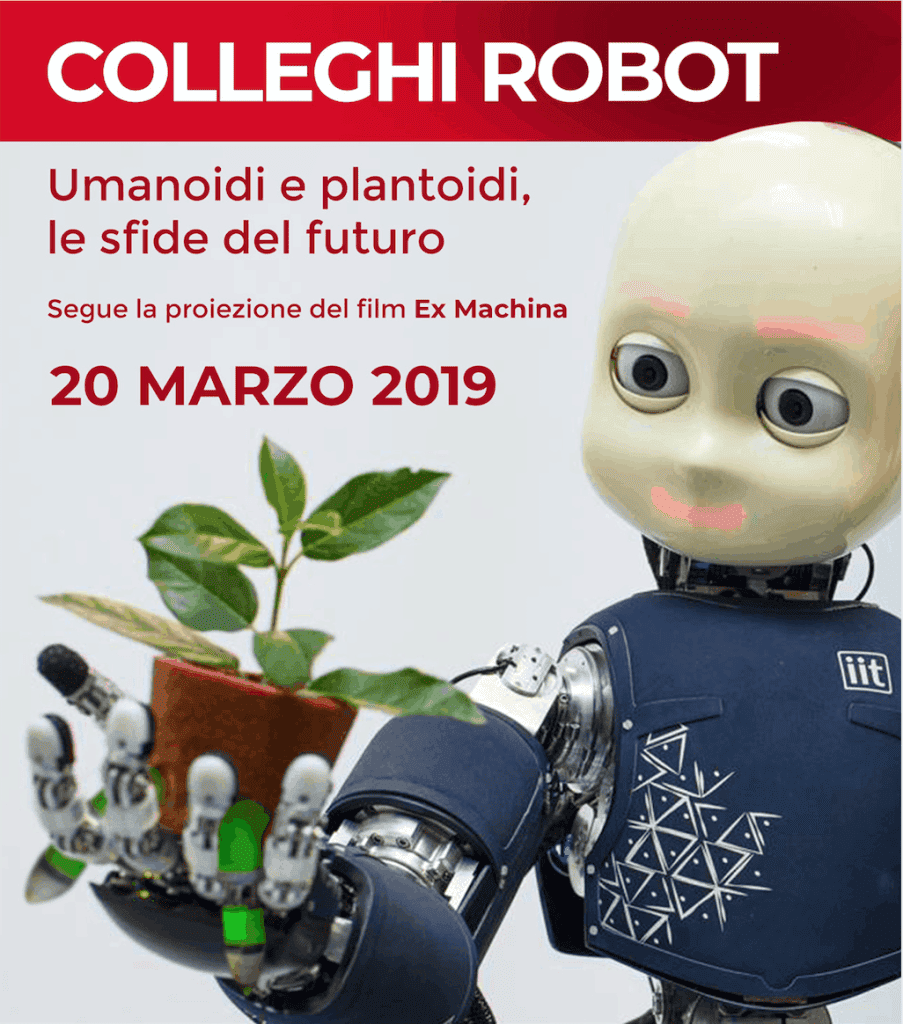
An unusual meeting: two scientists and a film to explore our future with robots
Mantova, Teatro SOMS, Piazza Pasotti, 48 Castellucchio
7.00 pm aperitif – 8.00 pm debate and screening
Free entry
There are those who foresee an unemployed humanity that survives on universal citizenship income and those who downplay the problem, arguing that the world of work will change but for the better, because robots will carry out all the heavy and dangerous jobs for health, and will offer greater guarantees of precision and will open the field to new professions, as happened with the mechanization of agriculture and the industrial revolution.
It was discussed on Tuesday 20 March 2019, at the SOMS Theater in Castellucchio di Mantua (7.00 pm with free admission), in a project curated by Viviana Kasam, organized by BrainCircle Italia in collaboration with Elabora, the Cultural Laboratory which has been deals with organizing, promoting and disseminating initiatives having as themes civil commitment, culture (art, literature, cinema, music etc.), economy, politics understood as the set of activities serving the community, religions , and in partnership with the entrepreneur Giovanni Bevilacqua, member of Elabora and main sponsor. The event was created thanks to the patronage of the Municipality of Castellucchio, which makes the SOMS Theater available, and the precious collaboration of Proloco Castellucchio.
Some predict that in the next fifteen to twenty years, 47% of jobs in the US are at risk of being replaced by robots: lawyers, bankers, doctors but also actors and showmen. And a recent symposium organized by Harvard University was dedicated precisely to the challenge of artificial intelligence and robotics in the field of medicine and employment in this sector.
The meeting presents the most innovative projects in the field of robotics and the relationship between humans and robots, taking into account the most innovative technologies that allow robots to learn and correct their behaviors, to “understand” the emotions of their interlocutors, to have tactile sensations. Arash Ajoudani, director of the Human-Robot Interfaces and Physical Interaction laboratory at IIT Genoa, will talk about recent progress in the creation of intelligent collaborative machines, which can assist workers in their daily activities in a productive and comfortable way. This assistive technology aims to reduce occupational musculoskeletal diseases, which represent the largest category of occupational diseases and are responsible for 30% of all workers’ compensation claims. This advanced technology can prevent worker fatigue and injuries, and provide intelligent assistance, improving productivity and well-being at the same time. “The main objective of collaborative robotics – says Ajoudani – is not to replace humans, but to help them in their daily activities, in an intelligent and effective way.
Barbara Mazzolai, director of the Micro-BioRobotics Center of the IIT of Pontedera, defined as one of the 25 most influential women in robotics worldwide, will talk about the plantoid robots that she is developing in her laboratory. These are robots that, for the first time worldwide, take inspiration from plants, their ability to move, perceive the environment and communicate. Like their biological counterpart, plantoids are also able to move through growth and modify their structure by interacting with the surrounding environment. By exploiting these properties of the green world, plantoids will open up interesting scenarios in the fields of land protection, exploration and medicine.
The debate concludes with the screening of the film Ex Machina, a psychological thriller written and directed by Alex Garland. Moderated by Viviana Kasam.



